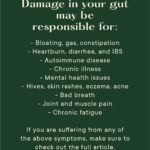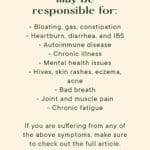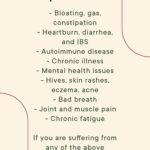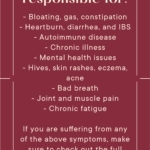We’ve all heard the saying “you are what you eat,” but it turns out that this could be true beyond our dietary choices.
You eat food to gain bacteria and the food you eat in turn feeds the bacteria. That bacteria then does a whole host of work for your body. It’s a beautiful system.
The gut microbiome refers to the billions of live bacteria humans have in the gut, but it also includes things like fungi and viruses.
The gut refers to the place where food is digested, metabolized, and absorbed to be delivered into the cells and provide the body with energy. It is essential in allowing for the removal of waste – this process of breaking down food creates bioactive compounds that either help support health or lead to inflammation, increasing the risk for disease.
One of the most interesting areas of recent nutrition research focuses on the gut – more specifically, the types of microorganisms that are present in the gut. These tiny organisms have a major effect on overall health and have already been implicated in a variety of conditions, including everything from gastrointestinal disorders to cardiovascular disease to asthma.

Your gut is its own complex ecosystem
There are about 250+ million stars in the Milky Way galaxy (+/- 100 million). Your gut is home to 100 trillion — yes, trillion —microorganisms, including about 35,000 different strains of bacteria. A mind-blowing fact!
The majority are found in the large intestine, particularly the colon, but bacteria can also be found in the mouth, esophagus, stomach, and small intestine. Interestingly, while ratios among different bacteria strains are common, everybody has their own bacterial “fingerprint” that is dependent on your life factors and even where you live in the world.
The bacterial cells in your body actually outnumber human cells and weigh in at about 6 lbs, heavier than your brain, and mainly live in your stomach. It may be unsettling to know that you’re carrying around so many bugs, but they are absolutely essential to your health, your hormones, your happiness, and your life.

Our Symbiotic Relationship
Researchers have discovered that the microorganisms in the gut play crucial roles in digestion, metabolism, and immunity. Without microbes in your gut, your body couldn’t break down the food you eat or use the energy it creates for body processes.
Your gut is responsible for more than 75 percent of your immune system. The intestinal flora in your gut communicates with the rest of your immune system to alert your body to the presence of a potentially harmful invader.
The gut has also been nicknamed “the second brain” because it has 100 million neurons and controls — at least in part — your mental state. Your gut contains 100 million neurons that respond to environmental threats, potential danger, and excitement. That’s why you feel butterflies in your stomach when you’re nervous or your stomach drops when you’re scared.
This intricate set of nerves is responsible for your “gut instincts” and subconsciously tells you how to react to environmental stimuli. Because it plays a role in so many areas of your body, a healthy gut is absolutely critical to your well-being.
When the gut is out of balance
If your gut is in disarray and the bacterial environment is out of balance, you’re going to feel it. Moreover, if you’re not eliminating properly, you’re going to feel it. These feelings can be in your digestive tract, in other parts of your body, or even in your mood and energy levels.
Although digestive symptoms like bloating, gas, constipation, heartburn, diarrhea, and irritable bowel syndrome are common indicators of a damaged gut, they are only the beginning. A damaged gut is also connected to autoimmune disease, chronic illness, and every mental diagnosis out there.
Damage in your gut may be responsible for hives, skin rashes, eczema, acne, bad breath, joint pain, and muscle pain. An imbalanced gut leads to chronic fatigue and low energy levels. The list really goes on and on and on which is why we put so much emphasis on gut health as part of your overall well-being.
Read Next: Everything You Need to Know About Lectins and Leaky Gut
Start healing your gut today with the help of the Your Daily™ Health Coaching app.











